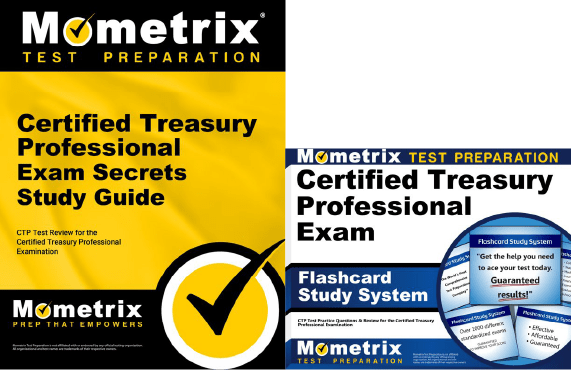If you need help studying for the Certified Treasury Professional (CTP) exam or just want some more information about what the exam is like, you’ve come to the right place.
Click below to take a free CTP practice test!
What’s on the Exam?
How to Register
Exam Scores
Retaking the Exam
What Test-Takers Are Saying
FAQs
Exam Eligibility
Before you can register to take the CTP exam, you’ll need to meet ONE of the following sets of requirements:
- You need at least two years of full-time experience in a career-based cash/treasury management or corporate finance-related position
- You need at least one year of full-time experience in a career-based cash/treasury management or corporate finance-related position AND a degree (graduate or masters) in business, accountancy, or finance
If you meet one of these requirements, you’re set to begin the registration process!
What’s on the Exam?
First, let’s talk about the questions on the exam. There are 170 multiple-choice questions total, but only 150 of the questions will count toward your score. Why is that?
The 20 unscored questions on the exam are added to the exam to determine if they’re good enough questions to add to future versions.
The trick is that you won’t have any way of knowing which questions are scored and which ones are unscored. Every question will appear like a scored question throughout the test.
The time limit for the exam is 3.5 hours. There aren’t any scheduled breaks, but you’re free to take restroom breaks as needed.
Let’s take a closer look at the different sections of the exam.
1. Maintain Corporate Liquidity Required to Meet Current and Future Obligations in a Timely and Cost-Effective Manner
37-41 questions
- Managing optimal cash positioning through short-term investing and borrowing activities
- Forecasting/managing cash receipts and disbursements
- Managing optimal banking structure
- Managing foreign exchange exposure
- Managing trade financing
- Managing intercompany financing
- Reviewing cash balances and reconciling transaction activity to ensure accuracy
- Optimizing treasury operations
- Calculating, analyzing, and evaluating financial ratios to optimize financial decision-making
2. Manage Capital Structure, Manage Costs of Long-Term Capital, and Quantitatively Evaluate Long-Term Capital Resource Investments
27-31 questions
- Negotiating and managing syndicated agreements
- Managing investment portfolio
- Managing issuance of debt and equity
- Managing revolving debt agreements
- Assessing impact of mergers, acquisitions, and divestitures
- Evaluating current market conditions
- Hedging foreign exchange, interest rate, and commodities exposure
- Administering dividends, issue, or repurchase of stock
3. Manage Internal and External Relationships
27-31 questions
- Building and maintaining relationships with external financial service providers
- Evaluating and implementing treasury products and services
- Administering bank accounts and maintaining documentation
- Identifying, negotiating, and selecting relationships and operational agreements with external service providers
- Serving as an internal trusted advisor and consultant
- Building and maintaining relationships with internal stakeholders
4. Monitor and Control Corporate Exposure to Financial, Regulatory, and Operational Risk
31-35 questions
- Complying with treasury policies and procedures
- Drafting treasury policies and procedures for approval
- Detecting and mitigating fraud
- Benchmarking performance against external sources to ensure best practices
- Evaluating and managing counterparty risk
- Developing, maintaining, and testing business continuity plans
- Managing merchant services programs
- Ensuring regulatory compliance and reporting internally and externally on compliance
5. Assess Impact of Technologies on the Treasury Function
17-20 questions
- Leveraging technology systems
- Identifying security issues and concerns associated with new and existing technology
- Monitoring information security risk and cyber-related risk
How to Register
Once you’ve ensured that you meet all of the eligibility requirements, you can register for the exam!
To get started, you’ll need to submit an application via AFP’s website. The application will ask you for your contact information and any documentation to prove your eligibility (among other things).
Exam Scores
The exam is scored using a scaled scoring method. Here’s how it works:
For every question you answer correctly, you get one point added to your raw score. At the end of the test, your final raw score will be converted to a scaled score. This scaled score will range somewhere between 200 and 500.
The reason your raw score is converted to a scaled score is because everyone who takes the test is given a slightly different set of questions. Since everyone has a different arrangement of questions, and because some questions are harder than others, converting your raw score to a scaled score ensures a more even playing field.
Retaking the Exam
If you didn’t get a passing score on your first try, that’s okay! You can retake the test during the next available testing window.
Keep in mind, you’ll have to pay $250 for each attempt.
What Test-Takers Are Saying
Don’t just take our word for it! See what real test-takers are saying about the CTP exam:
“They give you a virtual scientific calculator and a whiteboard. I had very few formulas, but my coworkers said he had dozens. For me, the present value and future value formulas were most asked.”

Glad-Peanut-8358
“There are only like 20 math questions, and there are like 50ish total formulas, so don’t waste a ton of time memorizing all the formulas. Focus on the major ones, like ECR calculations.”

Sufficient-Program27
“In the actual exam, to my surprise, there were probably about 25 formula questions, and most had some kind of trickery to them – so I would say definitely don’t skip the formulas, unless your 100% sure you’ll do well on theory.”

Repulsive_Gold_8234
FAQs
How many questions are on the CTP exam?
The exam contains 170 questions.
What is the time limit for the CTP exam?
The exam is timed at 3.5 hours.
What is the passing score for the CTP exam?
You’ll need to get a final scaled score of at least 300 to pass.
How much does the CTP exam cost?
The testing fee is $1,420.
Mometrix Test Preparation is not affiliated with or endorsed by any official testing organization. All organizational and test names are trademarks of their respective owners.



 CTP Study Guide
CTP Study Guide CTP Flashcards
CTP Flashcards